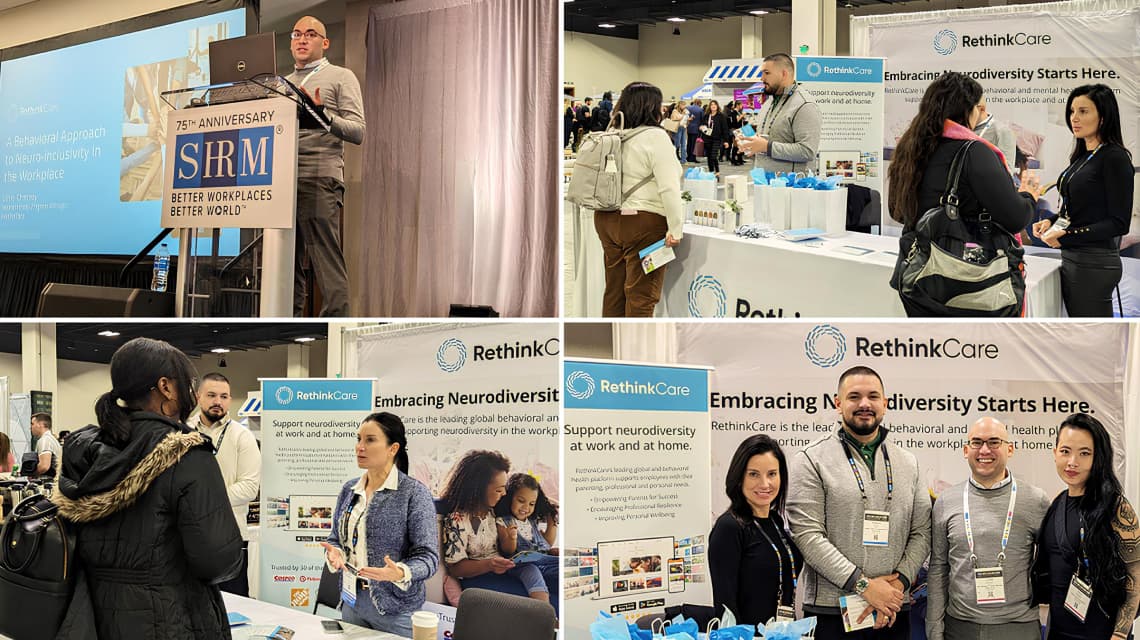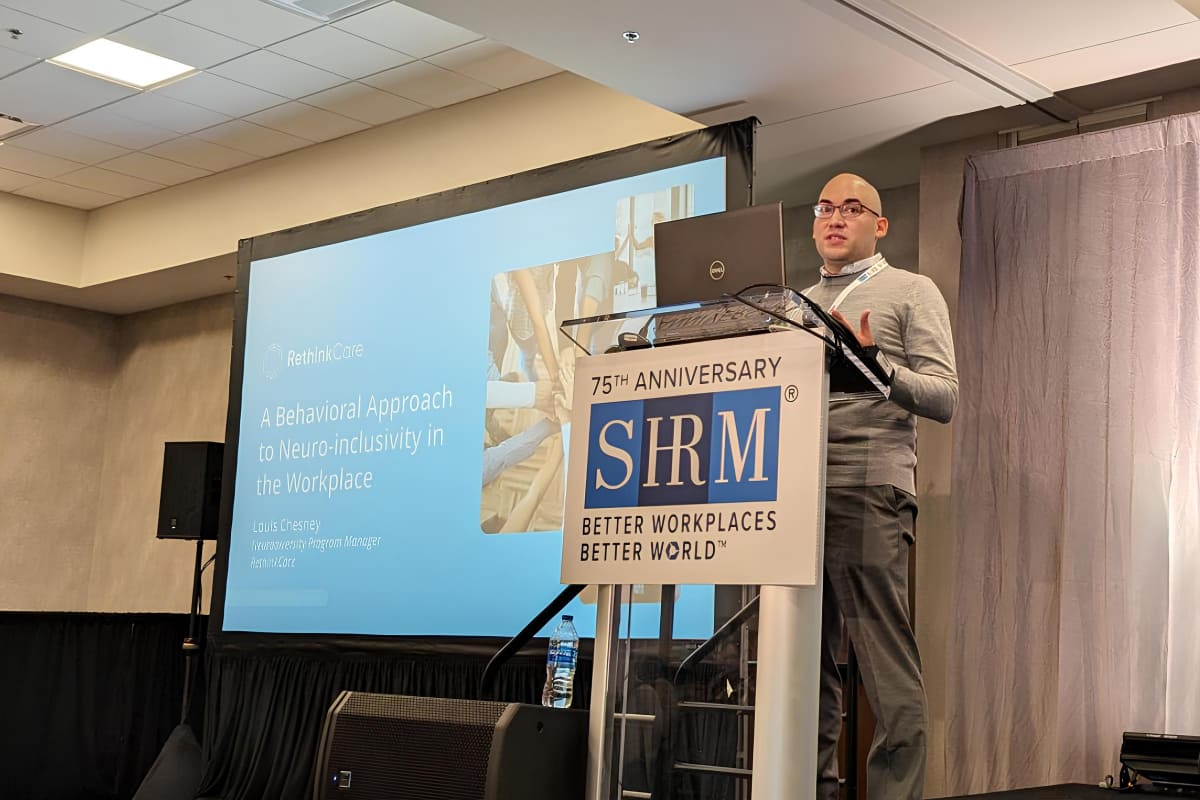I had the pleasure of attending this year’s SHRM Inclusion conference as the Neurodiversity Program Manager at RethinkCare, where I oversee the day-to-day operations and expansion of our neurodiversity course content and consultation approach.
This was my first time attending, and I was excited to connect with other Inclusion & Diversity (I&D) professionals, exchange ideas, and gain insights to enhance RethinkCare’s mission of helping organizations build truly inclusive and supportive environments for neurodivergent individuals. I left the conference with actionable takeaways and useful resources that I’m eager to integrate into our solution.
The SHRM Inclusion 2024 conference gathered I&D professionals, consultants, and thought leaders to share practical strategies for building workplace cultures that are more:
- resilient
- inclusive
- innovative
With participants from a wide range of industries and organization sizes, the event focused on overcoming challenges and achieving meaningful outcomes through I&D initiatives.
The conference featured over 200 sessions led by 131 expert speakers, covering topics like:
- implementing inclusive practices beyond surface-level policies
- recognizing and addressing bias to promote fairness
- valuing cognitive diversity and psychological safety
I gained valuable tools, strategies, and best practices to enhance I&D programs, foster inclusivity, and create lasting impact within organizational cultures.
Recurring Theme: Recognizing Common Challenges in I&D
A recurring theme at the conference was the challenge many organizations face in creating an inclusive culture that benefits all employees. The conference highlighted barriers such as:
- misalignment with business needs
- a lack of strategic behaviors in I&D programs
- leadership’s limited awareness of employees’ daily experiences in the work environment
Cristina Jimenez, senior partner and global head of RHR Culture of Belonging, discussed these structural issues in her session, “We Agree – DEI Programs Haven’t Worked – Spoiler Alert – It’s Not for the Reasons You Might Think!” Jimenez noted that many I&D programs falter not because they lack intent but because they often operate in isolation. She emphasized the importance of integrating I&D into change management and organizational development.
For instance, rather than running I&D as a separate program, organizations could tie inclusive practices to core business goals, such as customer satisfaction or innovation, and equip leaders and managers to promote inclusivity in daily interactions. This way, I&D becomes part of the organization’s foundational practices, supporting both employee experience and business performance.
Sessions led by speakers like Joy Johnson-Carruthers, founder of Jtraining Solutions, in “What to Do When You Can’t Talk About DEI at Work: A Cautionary Tale from the Front Lines of DEIB,” addressed societal challenges such as:
- political resistance
- economic pressures
- inconsistencies in I&D credentialing standards
With many I&D roles recently reduced or cut due to these constraints, Johnson-Carruthers highlighted the importance of ingenuity in achieving meaningful progress through subtle, consistent actions that can create profound change, even in restrictive environments. For example, this might include carefully incorporating inclusive language into everyday materials.
Emerging Theme: The Importance of Embracing Neurodiversity
Neurodiversity was an emerging theme of the conference, with sessions highlighting the importance of supporting neurodivergent employees. By creating an environment that embraces different thinking, behavioral, and social styles, organizations can tap into the unique strengths of neurodivergent individuals.
In my session, “A Behavioral Approach to Neuro-inclusivity in the Workplace,” I shared first-hand examples of how RethinkCare helps organizations foster neuroinclusive behaviors. These include:
- assuming positive intent
- encouraging colleagues to speak up
- valuing differing perspectives
- showing flexibility
These practices go beyond changing attitudes. They actively shape environments that support neurodivergent employees. By embedding these specific behaviors into daily interactions, organizations can build cultures that truly value diverse perspectives, leveraging the unique strengths neurodivergent individuals bring to the workplace.
By embedding these specific behaviors into daily interactions, organizations can build cultures that truly value diverse perspectives, leveraging the unique strengths neurodivergent individuals bring to the workplace.
Louis Chesney Share this
Attendees gained practical tactics and insights into how daily behaviors impact workplace culture, as well as exercises to apply these concepts directly. It was energizing to see the excitement and engagement from participants, many of whom expressed eagerness to implement these strategies in their own workplaces. One attendee even mentioned that it was the most informative session they had attended at the conference. Leaving the session, I felt both inspired and encouraged, knowing the ideas resonated deeply and had the potential to drive meaningful change.
Core Theme: Using Behavioral Approaches to Strengthen I&D for All
The session, “Civility and Belonging: The Healing of Our Workplaces,” by SHRM’s Inclusion & Diversity (I&D) Council highlighted the strong link between civility and belonging as essential to building an inclusive workplace culture for everyone through everyday behaviors. SHRM’s “3 Cs” framework (i.e., Civility, Communication, and Character) draws from Diana Damron’s book Civility Unleashed and serves as a guide for:
- fostering respect
- open communication
- accountability in our daily interactions
This approach emphasizes that true belonging is built through consistent, respectful interactions that make employees feel valued and heard. SHRM also introduced five key pillars of belonging:
- Cultivating a welcoming environment
- Creating a sense of being integral
- Involving employees in decision-making
- Providing support and recognition
- Offering opportunities for personal connection
Together, these pillars help shape a workplace culture where employees feel truly included.
Other sessions highlighted how individual behaviors of I&D practitioners can strengthen efforts. In her session, “Can We Be INDIVISIBLE?: Why ‘The Work’ Doesn’t Always Work and What We Can Do About It,” Denise Hamilton, CEO of All Hands, encouraged practitioners to embrace an optimistic and growth-oriented mindset, viewing challenges as opportunities for innovation and continuous improvement.
Hamilton shared additional insights to guide I&D practitioners in advancing inclusion within organizations:
- Recognize the limits of I&D expertise and stay open to new perspectives to adapt in an evolving world
- Approach I&D roles with a sense of ownership, which fosters accountability and long-term commitment
- Simplify language, slow down conversations, and ensure clarity to prevent misunderstandings and promote constructive dialogue among I&D stakeholders

The Future of Work is Inclusive and Empowered
All in all, the conference underscored that building an inclusive workplace culture needs commitment from both leaders and employees. Organizations can create empowering environments by:
- removing systemic barriers
- embracing neurodiversity
- modeling inclusive behaviors
For me, attending the SHRM Inclusion 2024 conference was an inspiring and transformative experience, reinforcing my dedication to promoting neuro-inclusivity in the workplace. Engaging with other I&D professionals and hearing from industry experts provided invaluable insights into how specific behaviors drive meaningful change, which I’m eager to bring back to my work at RethinkCare.


